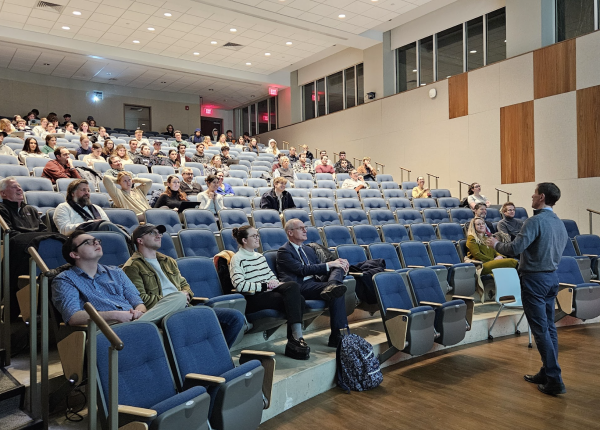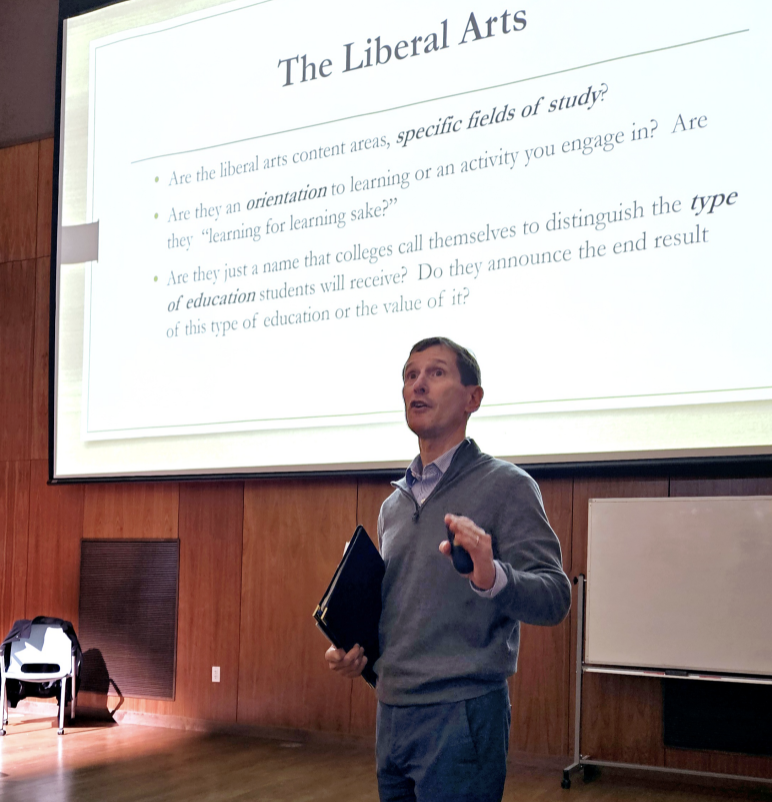With the news of a $2 million budget cut hitting academics, the campus community has been speculating about changes to the Conversatio program, philosophy and theology requirements, and more.
Dean Mark Cronin, who serves as Associate Vice President for Academic Affairs and Academic Dean of Saint Anselm College, addressed these questions along with broader national concerns about the status of the liberal arts in a lecture on Feb. 20.
During the lecture, he referenced an article in the previous issue of The Crier in which students “hurled questions toward President Favazza related to potential changes in the core curriculum,” as a demonstration of how students are concerned with the state of the liberal arts at Saint Anselm College.
College representatives have been adamant that no decisions have been made and there are several groups dedicated to assessing different aspects of potential cuts. Still, the campus community is rife with debate over how budget cuts could impact the college’s Catholic, liberal arts identity.
Honors Council member Grace MacDonald ’24 explained the value of a well-rounded education. “A lot of it layers on top of each other and then you come out with a wealth of knowledge,” she said.
MacDonald, who is also a tour guide, often shares this view with prospective students. “I always talk about how Conversatio lays a really good groundwork for the rest of our liberal arts education,” she said.
While many students seem to value the liberal arts, some acknowledge that an extensive list of core requirements can be strenuous when it comes to scheduling.
“I think that it’s important to have a variety of topics and courses, but I do think in terms of core requirements, that it was a little bit challenging to complete all of the cores in a timely manner,” said Emily Donovan ’24, a member of the Honors Council.
Theology and politics Professor Ward Holder is part of the committee examining possible changes to theology. While the committee has not begun its study yet, he expressed his opinion that trimming or cutting theology requirements could jeopardize the college’s Catholic identity.
“What I want to look at is what are we trying to accomplish here. If someone came to me and said ‘I can really learn how to reason in a Catholic theological manner in a single course,’ I would laugh,” he said.
One solution that Professor Holder offered was creating theology or photography courses that are taught in new ways or from different perspectives that interest students. For example, this semester he had to turn students away from his course on race and theology because more signed up than he could teach with a course cap of 22 students.
The question of balancing budget cuts while upholding academic, liberal arts integrity is one that concerns many institutions, not just Saint Anselm. Dean Cronin showed numerous headlines demonstrating how budget shortfalls are negatively impacting the liberal arts across higher education, such as the University of New Hampshire cutting its art museum.
Many of the articles that he referenced shared a common theme, that fewer number of students enrolling in liberal arts-related majors indicates a crisis that threatens the very existence of such programs. “History has declined 50 percent at Saint Anselm College… just the English major, 60 percent… philosophy and theology have fewer majors,” he said.
Dean Cronin pointed out that simultaneously the college has added new majors and course offerings in areas like communication, education, and health sciences. “The effect of adding new majors is that you have the same number of students with fewer majors in some of the classic majors,” he said.
Given the devaluing of arts and humanities in the public sphere, Dean Cronin asked “how must higher education respond?” He proposed different options. First, accept the apocalyptic nature of the situation by acknowledging that something is lost. Second, recognize the market forces at work and stop teaching subjects that people aren’t interested in.Third, just ride the wave and believe that these subjects will withstand the test of time as they have for hundreds of years.
“I think part of the problem is we need to decouple the numbers in majors and classes and reject the canary in the majors coal mine,” Dean Cronin said. This refers to how canaries would be sent down into coal mines to see if there was poisonous gas down there, as the birds’ deaths would be a warning sign not to send men down.
He continued to explain that the headlines describing “the death of the liberal arts” and charts showing the fall of enrollment for liberal arts-related majors are the canaries in the coal mines today.
One of Dean Cronin’s central arguments was to not hyperfocus on the numbers of majors and recognize that change is inevitable in academics. “Anytime there’s a cut to a program, and cuts to programs happen all the time, then when it gets put back in, when they have new majors and they’re good, new majors, it’s not only that we’re getting rid of certain majors, it is part of the natural evolution of higher education,” he said.
Especially related to any changes to theology or philosophy, Professor Holder emphasized the importance of keeping the college’s mission at the forefront. “We need to look more deeply at what we are trying to accomplish here and that might open up some doors that we have closed,” he said.
The presence of the monastery is also a key component of Catholic culture on campus, but it cannot be a replacement for theology courses. “[The monks] are a living example of a particular life dedicated to Christ, dedicated to the council’s of perfection to use an ancient term. That’s very different from an educational experience. I think the two go together, but at Saint Anselm we want to show you both,” Dr Holder said.
As advisory committees continue to examine potential academic cuts, the campus community will surely continue to debate the fate of the liberal arts as it stands currently.



